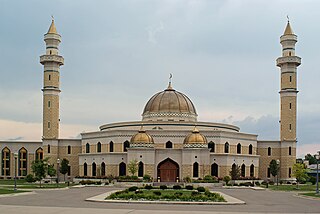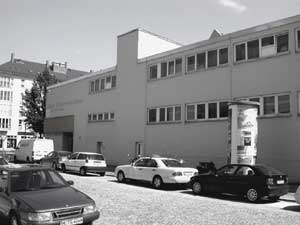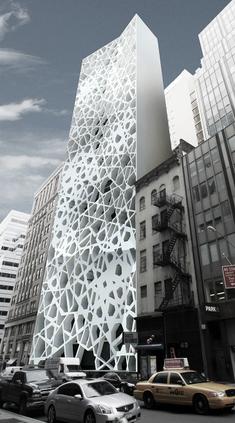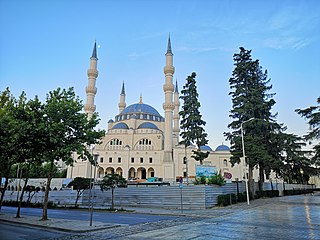A mosque, also called a masjid, is a place of worship for Muslims. The term usually refers to a covered building, but can be any place where Islamic prayers are performed, such as an outdoor courtyard.

Konya is a major city in central Turkey, on the southwestern edge of the Central Anatolian Plateau, and is the capital of Konya Province. During antiquity and into Seljuk times it was known as Iconium. In 19th-century accounts of the city in English its name is usually spelt Konia or Koniah. In the late medieval period, Konya was the capital of the Seljuk Turks' Sultanate of Rum, from where the sultans ruled over Anatolia.

Islam is the third largest religion in the United States (1%), behind Christianity (63%) and Judaism (2%), and equaling the shares of Buddhism and Hinduism. A 2017 study estimated that 1.1% of the population of the United States are Muslim. In 2017, twenty states, mostly in the South and Midwest, reported Islam to be the largest non-Christian religion. In 2020, the U.S. Religion Census found there to be 4.45 million Muslim Americans, or roughly 1.3% of the population.

Islam is the second largest religion in the Netherlands, after Christianity, and is practised by 5% of the population according to 2018 estimates. The majority of Muslims in the Netherlands belong to the Sunni denomination. Many reside in the country's four major cities: Amsterdam, Rotterdam, The Hague and Utrecht.

Islam is the most practiced religion in Turkey. As much as 90% of the population follows the Sunni Madhab of Islam. Most Turkish Sunni Muslims belong to the Hanafi school of jurisprudence. The established presence of Islam in the region that now constitutes modern Turkey dates back to the later half of the 11th century, when the Seljuks started expanding into eastern Anatolia.

The Islamic Center of Washington is a mosque and Islamic cultural center in Washington, D.C. It is located on Embassy Row on Massachusetts Avenue just east of the bridge over Rock Creek. When it opened in 1957, it was the largest mosque in the Western Hemisphere.

The Mosque in Sendling, Munich, Germany, is situated on Schanzenbachstraße. The mosque has existed there since 1989 as an Islamic prayer house mainly for Turkish Muslims.

The Directorate of Religious Affairs in Turkey is an official permanent state institution established in 1924 by the orders of Mustafa Kemal Atatürk under article 136 of the Constitution of Turkey to carry out some of the administrative duties previously managed by the Shaykh al-Islām, before the abolition of the Ottoman Caliphate. The President of the Directorate of Religious Affairs is considered the Grand Mufti of Turkey.

Argentina is a predominantly Christian country, with Islam being a minority religion. Due to secular nature of the Argentine constitution, Muslims are free to proselytize and build places of worship in the country.

In Turkey, secularism or laicism was first introduced with the 1928 amendment of the Constitution of 1924, which removed the provision declaring that the "Religion of the State is Islam", and with the later reforms of Turkey's first president Mustafa Kemal Atatürk, which set the administrative and political requirements to create a modern, democratic, secular state, aligned with Kemalism.

Religion in Turkey consists of various religious beliefs. While it is known that Islam is the most common religion in the country, published data on the proportion of people belonging to this religion are contradictory. The state registering everyone as Muslim by birth misleads the percentage of Muslims in Turkey. There are many people who follow other religions or do not adhere to any religion but are officially classified as 'Muslim' in official records unless they make a contrary claim. According to the state, 99.8% of the population is initially registered as Muslim. As much as 90% of the population follows Sunni Islam. Most Turkish Sunni Muslims belong to the Hanafi school of jurisprudence. The remaining 0.2% are Christians and adherents of other officially recognised religions like Judaism. The official number of Muslims include people who are irreligious; converted people and anyone who is of a different religion from their Muslim parents, but has not applied for a change of their individual records. These records can be changed or even blanked out on the request of the citizen using a valid electronic signature to sign the electronic application.

The Islamic Cultural Center of New York is a mosque and an Islamic cultural center in East Harlem, Manhattan, New York City, United States. It is located at 1711 Third Avenue, between East 96th and 97th Streets. The Islamic Cultural Center was the first purpose-built mosque in New York and continues to be one of the city's largest. The mosque's older dwelling in a townhouse at 1 Riverside Drive is still in continual prayer use as a satellite location.

Park51 was a development originally envisioned as a 13-story Islamic community center and mosque in Lower Manhattan, New York City. The developers hoped to promote an interfaith dialogue within the greater community. Due to its proposed location, two blocks from the World Trade Center site of the September 11 attacks, the proposed building was widely and controversially referred to as the "Ground Zero mosque".

Imam Shamsi Ali is a prominent Indonesian Muslim Scholar known for promoting interfaith dialogues among Abrahamic Religions in United States and the Chairman of the Al-Hikmah Mosque and the Director of Jamaica Muslim Center in Jamaica, Queens, New York City.

The Great Mosque of Tirana or Namazgah Mosque is a mosque which is currently being built in Tirana, Albania. When completed, it will be the largest mosque in the Balkans.

The architectural heritage of the Kosovo Albanians during Yugoslav rule was shown institutionalised disregard for decades prior to outright conflict at the end of the 20th century. Numerous Albanian cultural sites in Kosovo were destroyed during the period of Yugoslav rule and especially the Kosovo conflict (1998-1999) which constituted a war crime violating the Hague and Geneva Conventions. In all, 225 out of 600 mosques in Kosovo were damaged, vandalised, or destroyed alongside other Islamic architecture during the conflict. Additionally 500 Albanian owned kulla dwellings and three out of four well-preserved Ottoman period urban centres located in Kosovo cities were badly damaged resulting in great loss of traditional architecture. Kosovo's public libraries, of which 65 out of 183 were completely destroyed, amounted to a loss of 900,588 volumes, while Islamic libraries sustained damage or destruction resulting in the loss of rare books, manuscripts and other collections of literature. Archives belonging to the Islamic Community of Kosovo, records spanning 500 years, were also destroyed. During the war, Islamic architectural heritage posed for Yugoslav Serb paramilitary and military forces as Albanian patrimony with destruction of non-Serbian architectural heritage being a methodical and planned component of ethnic cleansing in Kosovo.

There are around 70,000 Muslims in Maryland in the United States as of December 1992, according to the American Muslim Council. This is the tenth highest number of Muslims of all U.S. states, representing 1.4% of the Muslim population in the country, as well as 1.4% of the total population of Maryland, at the time of the report.
Muharrem Hilmi Şenalp is a Turkish architect. His work is often inspired by Ottoman architecture. He has been called Turkish president Recep Tayyip Erdoğan's "court architect", and is a close friend of the president. His company, Hassa Architecture, specializes in neo-Ottoman style. Şenalp takes inspiration from 16th century architect Mimar Sinan, who worked for Suleiman the Magnificent.

Islam is the third most widely professed religion in New York City, after Christianity and Judaism. A 2018 study estimated that there are over 750,000 Muslims living in New York City, the largest population of Muslims by city in the United States. Approximately 9% of New York City residents are Muslim, constituting 22.3% of American Muslims, with 1.5 million Muslims in the greater New York metropolitan area, representing the largest metropolitan Muslim population in the Americas.—and the most ethnically diverse Muslim population of any city in the world.



















